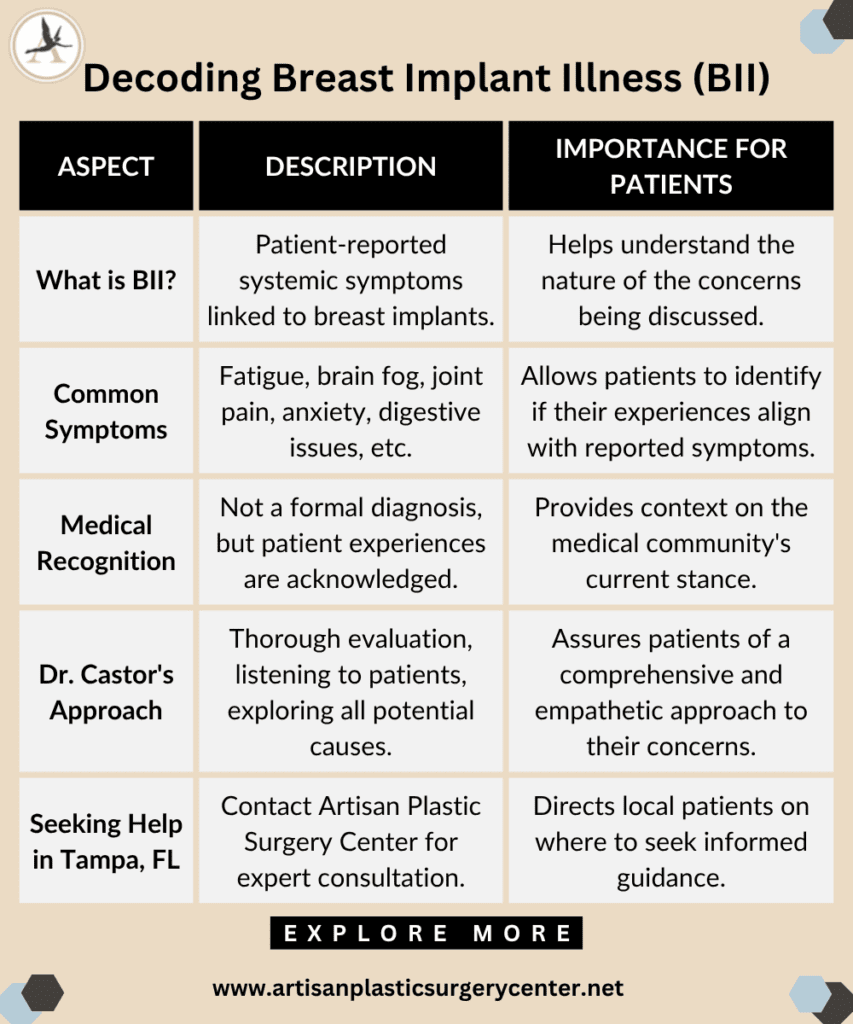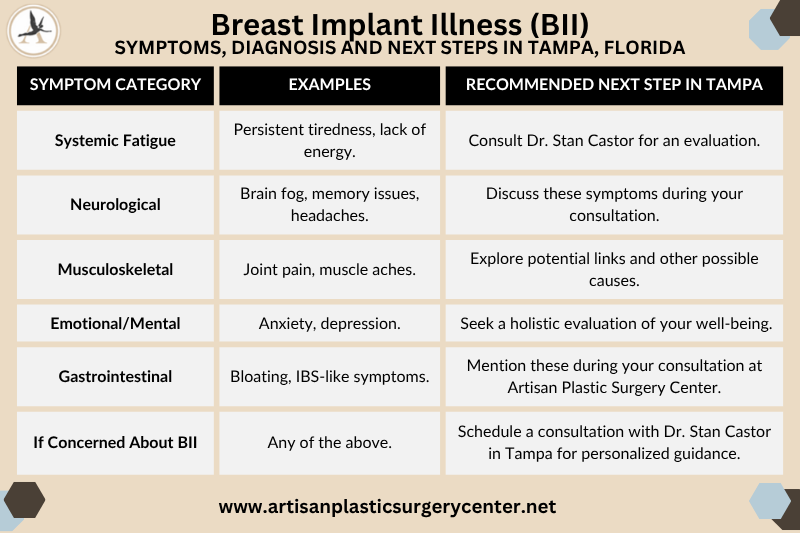Breast Implant Illness (BII) is a term used to describe a wide range of symptoms some patients experience after receiving breast implants. While not officially recognized as a medical condition, more women are reporting fatigue, joint pain, memory loss, and more. Dr. Castor shares insights on symptoms, potential risks, and implant removal options.
I’ve listened intently to the concerns of my patients, those who have implants and those considering them, about this constellation of symptoms that some individuals attribute to their breast implants. It’s a subject that deserves careful consideration, and I want to share my perspective, drawing from my experience and the available medical understanding.
Breast Implant Illness (BII): Understanding the Concerns and Finding Clarity
What is Breast Augmentation?
Breast augmentation is a procedure that, for many, brings newfound confidence and a greater sense of self. However, in recent times, a topic that has increasingly come into our discussions is “Breast Implant Illness,” or BII. Over the years, I’ve had the privilege of helping countless individuals achieve their aesthetic goals, and a significant part of my practice involves breast augmentation.
Is Breast Implant Illness Real? How Common Is It?
This is often the first question on people’s minds. The term “Breast Implant Illness” isn’t a formally recognized medical diagnosis by major medical organizations. However, that doesn’t mean the experiences of individuals reporting these symptoms are invalid. What we see is a group of symptoms that some patients with breast implants report, which they believe are linked to their implants.
The reported symptoms are wide-ranging, which makes it challenging to pinpoint a single, universally accepted definition of BII. Patients have described fatigue, brain fog, joint pain, anxiety, digestive issues, and a host of other complaints.
As for how common it is, it’s difficult to say precisely because it’s not an officially defined condition. Some studies have looked at the prevalence of certain systemic symptoms in women with breast implants compared to those without, but the findings have been varied. What’s clear is that a subset of individuals with implants do experience these symptoms and feel a connection to their implants.
Why Don’t All Plastic Surgeons Believe in Breast Implant Illness?
This is a fair question. From my perspective, and that of many of my colleagues, the challenge lies in establishing a direct, causal link between the implants and the diverse array of symptoms reported. Many of these symptoms are common in the general population and can be attributed to various other underlying medical conditions.
In my practice, when a patient presents with these concerns, my approach is to listen carefully and conduct a thorough evaluation. This often involves ruling out other potential causes for their symptoms through blood work, imaging, and consultations with other specialists if needed.
I recall Michela, a patient who came to me a few years ago. She had breast implants placed elsewhere and was experiencing significant fatigue and joint pain. She was convinced it was her implants. We had extensive discussions, and I recommended she see a rheumatologist to explore other possibilities. It turned out she had an underlying autoimmune condition that was unrelated to her implants. After addressing that, her symptoms improved significantly, even with her implants still in place.
It’s not that we dismiss the patient’s experience; rather, we approach it with a medical mindset focused on identifying the root cause, which may or may not be the implants themselves.

Breast Implant Illness (BII): The Spectrum of Symptoms
As I mentioned, the range of symptoms attributed to BII is broad. Some of the more commonly reported ones include:
- Fatigue: Persistent and often debilitating tiredness.
- Brain Fog: Difficulty concentrating, memory issues.
- Joint and Muscle Pain: Body discomfort as aches and stiffness.
- Anxiety and Depression: Mood disturbances.
- Digestive Issues: Bloating, irritable bowel symptoms.
- Skin Rashes: Unexplained skin irritations.
- Headaches: Frequent or severe headaches.
It’s important to note that experiencing one or more of these symptoms doesn’t automatically mean it’s due to breast implants. Many other conditions can cause these issues.
Symptoms of Your Body Rejecting Breast Implants
The idea of the body “rejecting” implants is more accurately described as an inflammatory response or the development of complications like capsular contracture. Capsular contracture is when the scar tissue (capsule) that naturally forms around the implant tightens, causing discomfort and sometimes a change in the shape or firmness of the breast.
While capsular contracture is a known complication, the systemic symptoms associated with BII are different. These are not localized reactions to the implant but rather body-wide complaints.
Can Breast Implants Trigger Autoimmune Disease?
Researchers continue exploring and discussing this topic. Some individuals with breast implants are diagnosed with autoimmune diseases. Such as Sjogren’s syndrome, lupus, or rheumatoid arthritis, and they wonder if their implants played a role.
Currently, the scientific evidence does not definitively prove that breast implants cause these autoimmune diseases. Large-scale studies have not shown a direct causal link. However, some individuals report the onset or worsening of autoimmune-like symptoms after receiving implants.
Can Breast Implants Affect Your Immune System?
The body recognizes any external substance as a potential threat. When something foreign enters the body, it triggers an immune reaction. The body naturally forms a capsule around breast implants, which is part of this response.
Whether this response can lead to broader systemic symptoms in some individuals is what’s being explored in the context of BII.
Sjogren’s Syndrome, Saline Breast Implants, Rheumatoid Arthritis, and Lupus: The Connections Patients Ask About
I often have patients asking specifically about these conditions regarding their implants. For example, a patient named Lisa came to see me, concerned about her saline implants and newly diagnosed Sjogren’s syndrome. She had read online about a potential link and was understandably worried.
In cases like Lisa’s, I emphasize the current medical understanding, which doesn’t establish a direct cause-and-effect relationship. However, I also acknowledge her experience and the importance of considering all factors. If a patient feels strongly that their symptoms are related to their implants, we discuss the option of explantation.
Breast Implant Illness: My Approach to Patients
If someone visits me worried about BII, my main focus is to hear them out in a non-judgmental way. I take a detailed medical history, discuss their symptoms, and perform a thorough examination. We then explore potential underlying causes for their symptoms.
If, after this process, a patient believes their implants are the cause of their systemic symptoms, and they wish to remove them, I support their decision. Explantation, with or without capsulectomy (removal of the surrounding scar tissue), is a procedure we can perform. I’ve seen patients who have reported feeling better after an explanation. For instance:
Annabel, one of my patients, had suffered from chronic fatigue and joint pain for years after getting silicone implants. After a comprehensive evaluation that didn’t pinpoint another cause, she opted for explantation. Several months later, she told me she felt a significant improvement in her energy levels and a reduction in her joint pain. While this is just one anecdote, it highlights the experiences some women have shared.
Importantly, patients should understand the surgical procedure with its own set of risks and recovery. And finally decide after careful consideration and a thorough discussion with your surgeon.
Breast Implant Illness (BII) – Common Concerns and Popular FAQs
Q1: “Are my fatigue and joint pain after getting breast implants a sign of BII?”
Dr. Castor: “That’s a common concern I hear. While fatigue and joint pain are symptoms some individuals with breast implants report, they can also stem from other health issues. It’s essential to have a comprehensive evaluation to determine the underlying cause.
We would explore your medical history and potentially recommend tests to rule out other conditions. If you’re worried, schedule a consultation to discuss your specific situation.”
Q2: “I’ve read that breast implants can cause autoimmune diseases like lupus. Is this true?”
Dr. Castor: “Many patients who are concerned about breast implants often ask this. Current scientific evidence doesn’t show a direct cause-and-effect link between breast implants and autoimmune diseases like lupus.
However, if you have concerns or notice new symptoms after getting implants, it’s something we should discuss. We will examine your medical records and decide the optimal plan for your situation.”
Q3: “What exactly is ‘Breast Implant Illness’ if it’s not a formal diagnosis?”
Dr. Castor: “Think of ‘Breast Implant Illness’ as a term some patients use to describe a range of systemic symptoms. As they believe it’s connected to their breast implants. These can include things like fatigue, brain fog, and joint pain.
While the medical community hasn’t formally recognized it as a distinct illness, we acknowledge that some patients experience these symptoms and are concerned about a link to their implants. My role is to listen to your experience and help you find answers.”
Q4: “If I think my breast implants are making me sick, what are my options?”
Dr. Castor: “If you feel your breast implants are contributing to your health issues, the first step is to have an open conversation with me. We can discuss your symptoms, review your medical history, and explore all possibilities.
If, after a thorough evaluation, you decide you want to have your implants removed (explantation), that is an option we can certainly discuss in detail, including what the procedure entails and what to expect during recovery.”
Q5: “Are certain types of breast implants more linked to BII than others (e.g., silicone vs. saline, textured vs. smooth)?”
Dr. Castor: “This is an evolving area of understanding. While concerns are speculating about textured implants and a specific type of lymphoma. However, the link between implant type and the broader range of symptoms referred to as BII, not yet clearly established by robust scientific evidence.
Every implant option carries its unique factors to weigh. We can examine the advantages and drawbacks of the various choices based on your requirements and worries. Learn more about different types of implants.”

Breast Implant Consultation – Moving Forward with Clarity and Solutions
The conversation around BII is evolving. However, it requires more research to better understand the potential links between breast implants and systemic symptoms. As medical professionals, it’s our responsibility to stay informed, listen to our patients, and provide the best possible care based on the available evidence and individual needs.
If you notice any concerning signs potentially linked to your breast implants, it’s advisable to seek medical guidance. My expert surgical team listens, evaluates, and discusses your options in a supportive and informed manner.
Schedule a complimentary consultation to find clarity and the best path forward for your health and well-being. You can also reach out to us by dialing (813) 971-2000. Lastly, check our mobile before and after picture gallery to see patient transformations.

